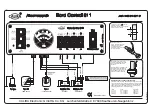
Cadillac CT4 Owner Manual (GMNA-Localizing-U.S./Canada-16500442) -
2023 - CRC - 5/10/22
Driving and Operating
365
If a cargo carrier is used in the
trailer hitch receiver, choose a
carrier that positions the load
as close to the vehicle as
possible. Make sure the total
weight, including the carrier, is
no more than half of the
maximum allowable tongue
weight for the vehicle or
227 kg (500 lb), whichever
is less.
Ask your dealer for trailering
information or assistance.
Towing Equipment
Hitches
Always use the correct hitch
equipment for your vehicle.
Crosswinds, large trucks going
by, and rough roads can affect
the trailer and the hitch.
Never attach rental hitches or
other bumper-type hitches.
Only use frame-mounted
hitches that do not attach to
the bumper.
Always seal any holes in your
vehicle if the trailer hitch
removed. If not sealed, dirt,
water, and carbon monoxide
(CO) from the exhaust may
enter your vehicle. See Engine
Exhaust
Consider using mechanical
sway controls with any trailer.
Ask a trailering professional
about sway controls or refer
to the trailer manufacturer's
recommendations and
instructions.
Tires
.
Do not tow a trailer while
using a compact spare tire
on the vehicle.
.
Tires must be properly
inflated to support loads
while towing a trailer. See
Tires
413 for instructions
on proper tire inflation.
Safety Chains
Always attach chains between
the vehicle and the trailer, and
attach the chains to the holes
on the trailer hitch platform.
Instructions about safety
chains may be provided by the
hitch manufacturer or by the
trailer manufacturer.
Cross the safety chains under
the tongue of the trailer to
help prevent the tongue from
contacting the road if it
becomes separated from the
hitch. Always leave just
enough slack so the
combination can turn. Never
allow safety chains to drag on
the ground.
















































